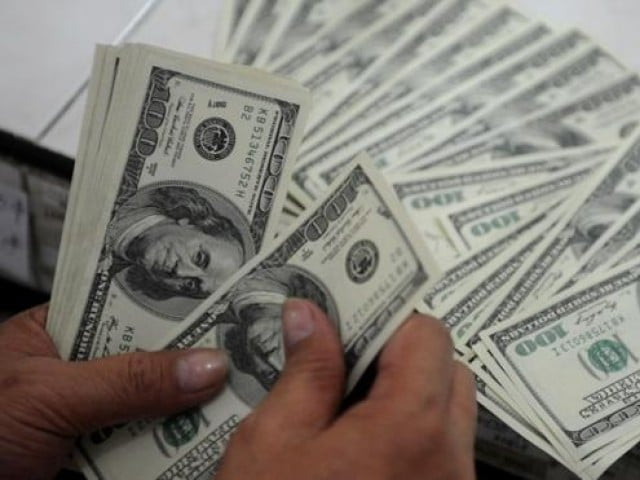Cabinet waives taxes of millions on foreign lenders
Also approves $3.3 billion in foreign commercial loans taken in the past one year

PHOTO: AFP
Headed by Prime Minister Shahid Khaqan Abbasi, the cabinet also waived millions of dollars in taxes that foreign lenders were supposed to pay Pakistan on the interest income they earned by giving the loans.
In its last meeting held on Tuesday, the federal cabinet also gave permission to the Ministry of Finance to borrow cumulatively $750 million from three foreign commercial banks to meet the burgeoning external financing requirements.
Asad Qaiser voices concern as tax exemption ends with K-P, FATA merger
With these approvals, total foreign commercial borrowing during the outgoing fiscal year 2017-18 would stand at nearly $4 billion.
The reckless foreign borrowing has remained the hallmark of the PML-N government as it has taken more than $44 billion of foreign loans in less than five years.
A summary seeking grant of ex-post facto approval to previously obtained loans of $3.227 billion, borrow $750 million more and exempt interest income of banks from taxes was sent by the finance ministry.
These loans have been taken from Citibank, Credit Suisse AG, Noor Bank of the UAE, Dubai Islamic Bank, China Development Bank, the Bank of China, Industrial and Commercial Bank of China (ICBC) and Emirates NBB Bank.
Most expensive loans were given by the Chinese banks.
The government took these loans after it failed to attract sufficient non-debt creating inflows like enhancing exports and foreign direct investment for meeting its external financing requirements.
In what appeared to be a disappointing statement, Prime Minister Shahid Khaqan Abbasi on Monday described loans as the only way to make economic progress. Contrary to the PM’s model for development, Asian countries like China and Singapore have developed by adopting export-led economic growth models.
The government has failed to introduce structural reforms that could have contained a growing current account deficit. Instead, it took short-term foreign commercial loans to meet financing requirements, which adversely affected the country’s debt-bearing capacity.
Pakistan’s official foreign currency reserves, largely built by borrowings, have been depleting fast. As of May 18, gross foreign currency reserves held by the central bank stood at just $10.3 billion, barely enough to finance two months of imports.
The finance ministry took $3.227 billion in loans without obtaining prior approval of the federal cabinet, which is necessary under the Rules of Business of 1973.
Rule 16(1) (d) of the Rules of Business states that ministries would bring “proposals for levy, abolition, remission, alteration or regulation of any tax and floatation of loans” for the approval of the federal cabinet.
However, the cabinet gave ex-post facto approval to those loans, regularising the borrowing. The ex-post facto approval is in violation of the spirit of the Supreme Court judgment of August 2016. The apex court’s ruling binds the government to initiate all fiscal matters with prior consent of the federal cabinet.
Pakistan obtained $3.227 billion short-term expensive loans from foreign banks between June 2017 and April 2018.
Most of these loans were obtained on the London Interbank Offered Rate’s (Libor) three-month floating average plus 2% to 3.25%, which comes to around 4.3% to 5.568%.
ICBC charged three-month floating Libor plus 3.25%, which translates into roughly 5.568% at today’s Libor rate.
The cabinet’s decision to waive taxes would directly benefit the banks that are earning higher interest rates. The Ministry of Finance informed the cabinet that “foreign commercial loans are offered with the condition that taxes applicable in Pakistan would not be borne by the lenders”.
Pakistan obtained two loans of $655 million from Credit Suisse at three-month floating interest rate of Libor plus 2% in the current fiscal year. The cabinet allowed to accept another $350-million loan offer from Credit Suisse, said sources.
Govt urged to abolish taxes on property
The cabinet was informed that $150-million loan was being negotiated with the Noor Bank of the UAE, but its terms had not been finalised yet.
The government was also in negotiations with Emirates NBD Bank for a $200-million loan, which the cabinet allowed the Finance Ministry to acquire. The loan is expected to be disbursed this week.
The government took $267-million loan from Citibank at three-month floating rate of Libor plus 2.7%. It also obtained $105 million from Dubai Islamic Bank.
ICBC gave $1 billion at three-month floating rate of Libor plus 3.25%, which was very expensive compared with loans taken from European and Gulf banks. The cabinet also gave ex-post facto approval for $200-million loan from the Bank of China and $1-billion loan from China Development Bank.
Published in The Express Tribune, May 30th, 2018.
Like Business on Facebook, follow @TribuneBiz on Twitter to stay informed and join in the conversation.



















COMMENTS
Comments are moderated and generally will be posted if they are on-topic and not abusive.
For more information, please see our Comments FAQ